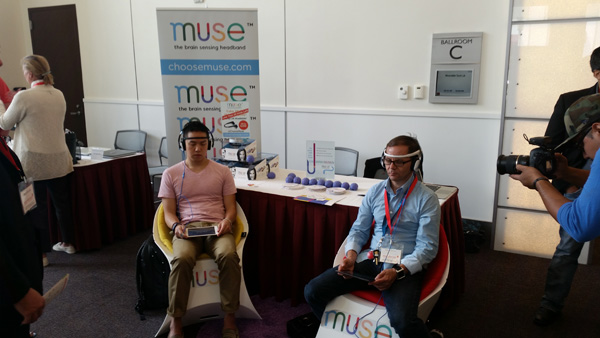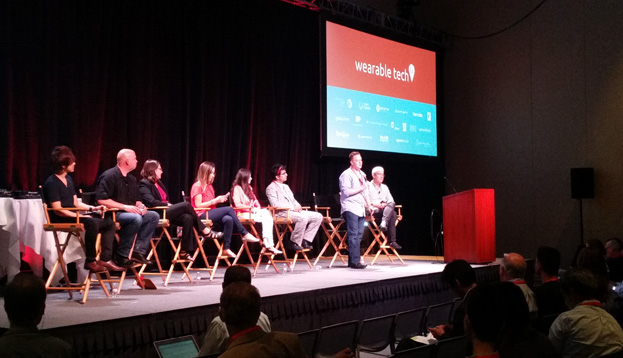Yesterday, experts in the wearable technology industry graced the Pasadena Convention Center with innovative insights in Los Angeles’ biggest wearable event of the year, Wearable Tech LA.
Of the 20 keynotes at the event, there were two presentations whose message seemed particularly targeted to marketers. These were “The Future Of Wearable Entertainment And Hollywood” and “The Future Of Wearable Music”
Seven speakers*, tackled the topic of wearables in entertainment, with each advocating for a different field of wearable technology. The prevailing view of this group, as stated by Kayvan Mirza (CEO of Optinvent), is that, “What’s happening now is that technology is catching up with what entertainment’s vision of wearable technology has been.”
Moderator Ken Hertz, Sr. Partner at the Law Firm of Hertz and Lichtenstein LLP, challenged the panel with the generic question, “What impact will these devices have on entertainment.”
In his opinion, the answer might be, not so much. In fact, Hertz went on to tell [a]listdaily, “The only reason that there is this concept of wearable technology is not that were trying to figure out how not to carry our technology with us, but rather become [ourselves] part of the Internet of things. Wearable technologies are sort of a clumsy way of describing that we, in fact, will be connected devices.”
 Attendees try on Muse’s headband outfitted with brain sensors.
Attendees try on Muse’s headband outfitted with brain sensors.
Naturally, the panelists, all of whom had developed or are pushing these types of products tended not to agree with this less-than-enthusiastic assessment. But as if to put an exclamation mark on his point of view, Hertz went on to say, “I think we have to be vigilant and pay attention to the things that take our humanity away. I think in the very near future we will laugh about this period of time when we strapped devices to ourselves.”
In the end, the one thing both sides agreed upon is that the wide adaptation of wearable technology will require branding these products in association with high profile individuals, much in the way Dr. Dre and Michael Jordan associated their names with their particular line of products.
Next on the agenda was the fun part — a live demo on how wearables are changing the music industry.
The panel consisted of speakers Ed Tang, Head of Global Marketing at Avegant; Nadeem Kassam, CEO of BioBeats; and David Plans, Co-Founder and VP of Product Science at BioBeats alongside moderator Chris Gore of G4TV and DJ Eric Sharp.
Kassam and Plans began the performance by showing off their piece of wearable technology, music that is dynamically generated from a user’s own unique heartbeat. They demonstrated this by hooking a cell phone up to the room’s sound system and running around stage. The tool in their device produced more up-beat music the more the demonstrator moved around, proving that the technology learns about the user from their biometric data and adapt to help them live a more engaging, healthier life.
Next, Tang dazzled the audience with his pair of “Smart Headphones.” This was basically a headset designed to turn the immersive experience of the Oculus Rift into something decidedly more mainstream. It looks like a hefty pair of black or white headphones, but it’s the display located on the headband that makes them so unique. The headphones harness a piece of technology known as Virtual Retinal Display, which is supposed to be similar to looking through a window.
“We’re trying to recreate your vision as closely as possible,” Tang said. “Look at how you naturally see. When you look around the room, your eyes don’t get tired. You can see 3D. And you don’t get nauseous or get headaches around the normal world.”
The product won first prize at CES for best mobile product and has raised over $1.5 million from a crowdfunding campaign earlier this year.
“We’re creating a product that is real and applicable for people, and that’s really cool,” Tang added.
In addition to the panel discussions, the convention center featured an exhibition area designated for curious attendees that was filled with innovative displays and demonstrations from almost every major wearable company in attendance.
Some popular tables seemed to be Muse’s which fostered a brain sensing headband, Actonr’s rocket skates, and Optinvent’s smart glasses. Other notable keynotes included “The Future of Smart Footwear,” “Emerging Wearable 2.0 Health Platform,” and “The Wearable Economy: How To Create A Mass Market For Wearables.”
*Erick Miller, Founder & CEO of Epiphany Eyewear; Andy Grignon, CEO of Quake Labs; Ariel Garten, CEO of InteraXon; Takuro Yoshida, President of Logbar Co.; Janet Hansen, Founder & Chief Fashion Engineer of Enlightened Designs; Kayvan Mirza, CEO of Optinvent; Stuart Brazell, TV Host/Producer.

